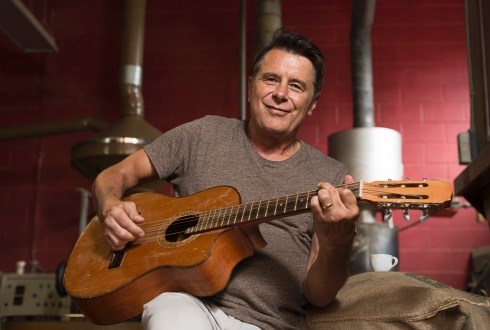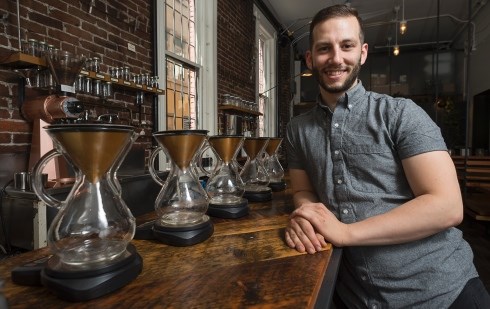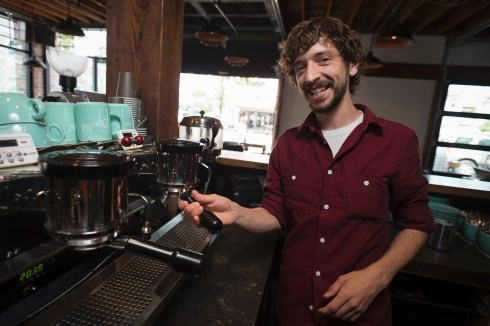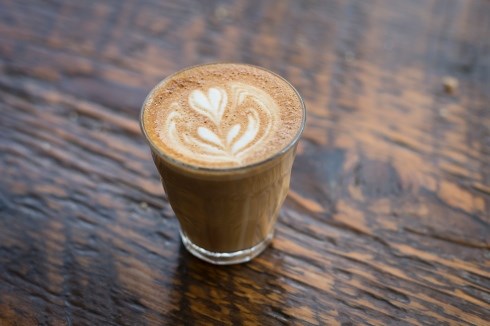With a warm purr and a gurgle, the hot dark liquid slides out of the imposing stainless steel hulk sitting atop the bar at Milano Coffee on West 8th. Nearly the size of a V-8 engine, it produces just a dainty cup’s worth of black gold: Owner Brian Turko’s own La Futura espresso blend.
Turko takes a small spoon and barely dips its tip into a bowl of sugar, dissolving the crystals into the thin layer of crema floating atop his coffee.
“Just a touch of sugar,” he says as he stirs, “and it opens up your taste buds.”
The flavours are complex, and intense. There’s nutty cocoa, hints of citrus and vanilla. There’s spice too – cloves and cardamom – and a sweet toffee finish. Ten different kinds of arabica beans go into this blend, each with its own personality, each a variable in the equation.
Last year, La Futura brought home gold at Italy’s International Coffee Tasting Competition, beating out espresso blends from around the world.
Turko is one of a growing number of local artisan coffeemakers who are finding success by following their passion for the bean. And like the many different beans in an espresso blend, Vancouver’s many independent coffee shops each have their own personality.
The Innovator

Vancouver has always been a coffee town, thanks to the many Italian immigrants who settled in our fair city and brought their delicious traditions with them.
Turko grew up just a few blocks away from the espresso shops of Commercial Drive. Although he was an outsider in the heavily Italian neighbourhood, Turko nevertheless fell in love with the social nature of the coffee shop at an early age.
“That’s where the girls were,” he chuckles.
Before long, he found himself working in the cafés he frequented, learning the secrets of the trade.
Turko and his wife Linda struck out on their own in 1997, opening Turk’s Coffee Bar. Their little café was the first non-Italian coffee shop on the Drive, and for a time at least, was largely ignored by the community.
“We were coffee geeks before there were coffee geeks,” says Turko.
But soon word got out, and within months the coffee shop became a Commercial Drive staple. Six years later the couple bought Milano Coffee and its roasting facilities on West 8th, where former owner and master torrefazoni Francesco Curatolo took Turko under his wing and shared with him his craft.
Through a doorway into Milano’s back room lies Turko’s laboratory. Here in the roasting room, he oversees every aspect of his coffee’s production, from the roasting, to the blending, to the packaging, all the while, plucking a tune on a beat-up acoustic guitar.
“The key characteristics of coffee are its body, flavour, aroma, and acidity,” Turko explains. “[As a roaster], you have to pair these elements and match it to the tastebuds: Sweet, sour, salty, bitter, and umami.”
The sweet spot for roasting takes place between 200 C and 221 C. Even one degree over can burn the beans.
Darker roasts produce a fuller flavour with more caramelization and bitterness, while lighter roasts produce subtler flavours, with more acidity and more caffeine.
Chains like Starbucks – which are notorious for over-roasting, if not burning, their beans – have helped popularize a taste for dark roasts on the West Coast.
Starbucks opened its first location outside of the U.S. here in Vancouver at Waterfront Station in 1987. The shop was an instant hit with caffeine-addicted commuters, and today the global coffee chain operates close to 100 locations within the city limits. Until 2012, the intersection of Robson and Thurlow featured a pair of Starbucks shops, right across the street from each other.
Not long after Starbucks arrived on the scene, the Blenz coffee franchise opened its first location at Robson and Bute in 1992. The chain is one of the biggest in BC and now stretches across the Pacific Rim with locations in Japan and the Philippines.
While Tim Hortons holds more than 60 per cent of the Canadian coffee market, Vancouverites didn’t get to roll up their rims until 1994, when the first BC location opened on East Hastings. But the weak drip coffee the chain offers has never had much appeal to Vancouverites.
“What Starbucks has done is popularize European coffee culture,” says Turko.
According to the Coffee Association of Canada, more than 65 per cent of Canadians drink coffee daily, averaging 2.8 cups per day.
And while corporate coffee chains of every variety have spent big bucks on advertising to encourage that daily coffee ritual, Vancouver’s coffee drinkers are growing up, says Turko.
And after decades of corporate coffee, Vancouver’s java junkies are ready for the real thing, and their tastes are expanding: Pour-overs, single-origin, artisan roasting.
Coffee fans are beginning to realize there’s more to coffee than burnt beans and sugary, milky drinks.
For Turko, his product has finally caught up with his customers.
Three-and-half years ago Milano’s Gastown location was the first coffee shop in the city to offer pour-overs. Common in Japan, this take on traditional filter coffee is brewed to order using a glass carafe and a specially-designed kettle, producing an exceptionally smooth and flavourful cup of black coffee.
Today, pour-overs can be found in just about any independent coffee shop in the city.
“We don’t follow trends,” says Turko. “We follow the art of coffee gastronomy.”
The Young Gun

For Revolver Coffee owner and manager George Giannakos, coffee is in his blood. Giannakos grew up surrounded by coffee culture in his parents’ shop, The Daily Roast, on the Sunshine Coast. The coffee shop quickly became a Sechelt landmark after it opened in the early 1990s, and still operates today, albeit under different owners.
“There were no Starbucks around then,” recalls Giannakos. “If you wanted a coffee, you had to go to a diner or a gas station.”
While he was immersed in all things coffee-related for years, it wasn’t until his parents opened Crema Coffee Bar in West Vancouver that Giannakos began to take coffee seriously.
“That’s when I learned to taste it, to serve it, to really appreciate it,” he says.
Before long, Giannakos had left the nest, travelling around the world to sample coffee culture in places like Montreal, Portland, New York, and Japan. What he learned, he brought back to Vancouver, and in 2011 opened Revolver on Cambie in Gastown with the help of his family. The thoroughly modern coffee shop has quickly gained a devoted following thanks to its hip personality and devotion to the art of coffee.
“We wanted to create a super coffee-focused place with great service, tons of options, and if you don’t want to geek out, that’s great too,” says Giannakos.
In addition to offering traditional espresso blends and pour-overs, Revolver also features a wide range of single-origin coffees, which contain one type of bean, from one farm or region, roasted one way. The result is a coffee with a very specific and distinct flavour, allowing the shop to offer a variety of different flavours from geographical regions around the world.
“And people want to know where their coffee is coming from,” says Giannakos.
That sense of connectedness applies to the store itself. Independent coffee shops are members of the community they serve, and, compared to corporate chains, a greater percentage of their profits stay in that community. And their customers realize that.
“There’s a very real personality with each business, and with chains, you don’t get that same personality and spirit,” says Giannakos. “At the end of the day, there’s a lot of passion in the independent shops, and you can get a unique product.”
For Giannakos, it’s as much about the coffee as it is the experience. And while Vancouver’s coffee drinkers are thirsty to explore the creative new world of the independent coffee shop, he understands they are also creatures of habit.
“It’s a delicate thing,” he says. “Everyone has experience with [coffee], so everyone has an expectation of how it should be.
“And it’s easy to come across as pretentious when you’re doing something different.”
The Rising Star

Barista Cole Trepanier grew up in rural Hope, far away from the coffee scene of the big city. But in a town with not much to do, the local coffee shop was a godsend.
“That’s where we would all hang out,” he says. “There wasn’t a lot of access to anything truly special, but that’s what we had.”
After moving to Vancouver in 2008, Trepanier decided to pursue his love of coffee professionally and train as a barista.
Last month, Trepanier took first place at the Western Regional Barista Competition, hosted by Rocanini Coffee Roasters in Richmond, earning him a spot at the Canadian National Barista Competition in Mississauga next month.
“I love the ritual of making my coffee,” says Trepanier, who pulls espressos for 49th Parallel Roasters on Main. “It’s such a sensory experience.”
During the competition, baristas give a 15-minute service-oriented presentation, serving four espressos, four cappuccinos, and four signature beverages to the judges. It is a race against the clock as competitors are scored on a complex set of rules that emphasize cleanliness, taste, professionalism, efficiency and mastery of craft. It’s not enough to have a perfect flavour profile, however. Competitors are also judged on their ability to be personable.
“Customer service is such a big part of what we do,” says Trepanier. Of course, technical skills and a highly-refined palate are also necessary. Working an espresso machine is a delicate art that requires constant taste-testing and recalibrating to ensure a consistent product, Trepanier explains.
“The weather, the humidity, the heat of the grinder, everything goes into account,” he says. “If we open the garage doors here, it completely changes the profile of the coffee.”
Trepanier’s passion for coffee is evident, and infectious. And that’s part of the appeal of an independent coffee shop.
“We’re passionate, but we tread careful ground,” he says. “We don’t want to be pretentious, we just want people to care about coffee the way we care about coffee.”
While Trepanier says there’s an invisible divide in Vancouver between those who only go to the independent coffee shops and those who get their coffee wherever, overall, customers are much more educated and willing to try new things.
“Have an open mind, try a different roast profile, talk to your barista, and you’ll get to understand the nuances of the flavours,” says Trepanier.
And don’t be afraid to ask your barista any questions you might have.
“It’s always exciting for a barista to get to talk about coffee with customers and share our passion.”

(All photos by Jennifer Gauthier)


